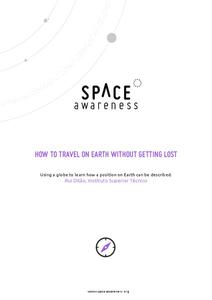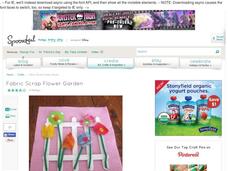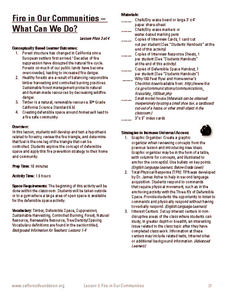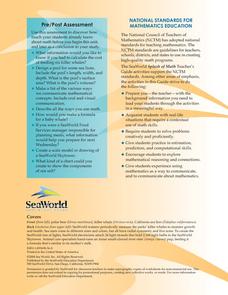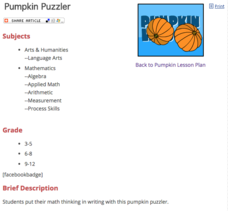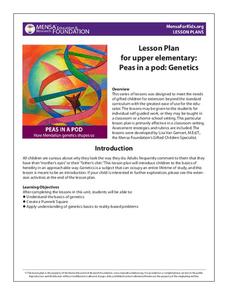Space Awareness
How To Travel On Earth Without Getting Lost
Have you ever wanted to travel the world? Take a virtual trip with a geography lesson that uses longitude and latitude, the position of the sun, an astronomy app, and a classroom globe.
Curated OER
Fabric Scrap Flower Garden
Crafting is fun, it increases eye-hand coordination, and it is a great way to accent any lesson. Celebrate Earth Day by creating scrap fabric flowers for a pop-stick flower garden. Children of all ages will love gluing, cutting, and...
Curated OER
Rational Number Project
Infuse your unit on fractions, decimals, and operations with a thorough module about rational numbers. With a teaching guide, learner examples, templates for instruction, and lesson rationale, the module is a solid way to emphasize the...
Baylor College
How Do We Use Water?
Send youngsters home to survey how they use water in their homes. Then bring them together to discuss which uses are essential for our health and which are not. A helpful video offers teaching tips for this lesson plan, and a...
Cornell Lab of Ornithology
Investigating Evidence
Explore the scientific process through nature. Scholars become scientists as they develop a question, design an experiment, collect data, and analyze their results. A two-week lesson guides your classes through the process and provides...
Sargent Art
Rainforest Mural
Whether you are an art teacher or a teacher looking for a great project to finish off a unit on the rainforest, this instructional activity is for you. Here are some great teaching tips and instructional practices that can help you and...
Forest Foundation
Fire - How Does it Relate to You?
Forest fires can be a necessary step in keeping a forest healthy, but what happens when they get out of control? Learners investigate the causes and effects of forest fires in two specific areas, culminating in a report about the ways...
NEED Project
Calibrating Thermometers
Engage young scientists in the upper-elementary and middle school grades with this collection of simple experiments. Whether you're teaching about heat transfer, density, or potential energy this resource has a lab for you.
Forest Foundation
Fire in Our Communities - What Can We Do?
Learn about defensible space and renewable resources with a lesson about forest fires. After exploring the ways that humans have impacted the environment, kids conduct mock interviews about differing points of view in the conservation...
NASA
Space Images
As technology advances, so does our understanding of the universe around us. Thanks to the Hubble Telescope, Mars rovers, and other high-resolution cameras, there are amazing photographs of celestial bodies, planets, comets, and more...
Vosonos
Interactive Minds: Solar System
Travel through space as you learn about the galaxy, solar system, planets, and much more. An extensive resource for studying astronomy in upper-elementary and middle school classrooms.
Sea World
Splash of Math
How can kids use math to learn about marine life? Combine math skills with science lessons in a resource featuring activities about life in the sea. Kids graph and calculate data, solve complex word problems, measure geometric shapes,...
Curated OER
Ecosystems
A critical look into the structure and function of ecosystems is here for young learners as a series of lessons and worksheet activities. Topics covered include land-based and marine ecosystems, connections to the water cycle, food webs,...
Bethel School District
Observations and Inference
What's the difference between qualitative and quantitative observations? Learners make observations, inferences, and predictions about their environment with a set of questions and activities that are applicable to either language arts...
Project WET Foundation
The Blue Planet
What a neat interactive that interacts with the amount of water on Earth's surface. It begins with a brief audio introduction of the Blue Planet and how it got its name. Then, users click on the activity to play a game that calculates...
Project WET Foundation
Investigate Fresh Water
It's all about freshwater in this water interactive! Users navigate through freshwater habitats such as lakes, rivers, and wetlands, taking note of the animals that live there. They also look at a desert habitat for comparison. Learners...
Project WET Foundation
Use Water Wisely
What's the point in saving water? Surprisingly water isn't a forever resource because it is a natural resource. Here, young water conservationists hunt for 23 wise water users and water wasters by clicking on the people in the...
Project WET Foundation
We All Use Water
How many ways is water used? Indirect and direct water use are the two main ways humans use water, but the usage comes in many forms. Animals, agriculture, industries, transportation, and many more rely on water for different uses....
NOAA
Satellite Communications
How do satellites communicate? What types of satellites orbit Earth? Discover and mimic the way satellites communicate between two points in a hands-on activity that has pupils using mirrors, flashlights, and marbles.
Melissa Institute for Violence Prevention and Treatment
Concept Muraling
Concept muraling helps learners improve their comprehension of a text by giving them a way to organize their understanding of the key concepts in that text. Introduce readers to this process with a carefully scaffolded lesson plan that...
Curated OER
Crazy for Cubes: Art and Science
Learners discuss Sol LeWitt and conceptual art, then analyze the differences in expressing a concept through model-based inquiry and aesthetic art criticism. They develop a geometric, scientific, or mathematical concept, then create an...
Education World
Pumpkin Puzzler
Light the Halloween festivities with an exercise that connects math, physical science, and language arts. After watching a demonstration of a burning candle, learners use division, multiplication, or algebra to determine how many boxes...
MENSA Education & Research Foundation
Peas in a Pod: Genetics
Can peas have grandparents? Learn about inherited traits and heredity with a set of activities focused on Mendelian genetics. As your class learns about the process of passing traits along in Punnett squares, they take on the role of...
Curated OER
Worm Bin Project Data Exchange
Students work collaboratively to exchange data with their peers (groups of students at other schools) about their worm bin project. They discuss differing findings and hypothesize reasons for these differences.
Other popular searches
- 4th Grade Science Project
- Physical Science Projects
- Science Project on Pulleys
- Science Project Volcano
- Science Project Gravity
- Science Project Ideas
- Forensic Science Project
- Science Fair Project Ideas
- Rock Science Project
- Science Project Food
- Science Project Terrarium
- Science Fair Project Data


